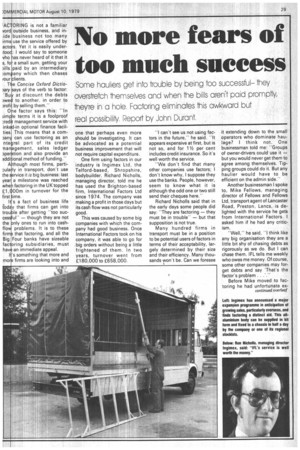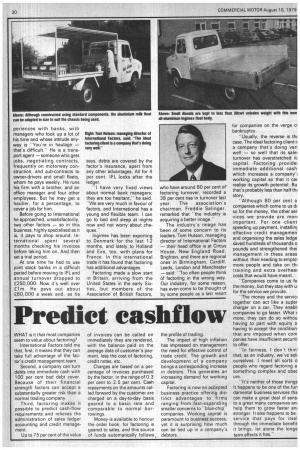No more fears of too much success
Page 31

Page 32

If you've noticed an error in this article please click here to report it so we can fix it.
Some hauliers get into trouble by being too success-ulthey overstretch themselves and when -ne bills aren't paid promptly; they're in a hole. Factoring eliminates this awkwarc but
real possibility. Report by John Durant,
'AC ORING is not a familiar vord outside business, and in,ide business not too many irms use the service offered by acto s. Yet it is easily under:too I would say to someone vho as never heard of it that it s, fo a small sum, getting your )ills paid by an intermediary :om any which then chases tour lients.
e Concise Oxford Dictio7ary says of the verb to factor: 'Bu at discount the debts )we to another, in order to 31-of i by selling them."
0 e factor says this: "In ;im e terms it is a foolproof 1:red management service with ink -in optional finance facilties This means that a com3an can use factoring as an nte ral part of its credit management, sales ledger 3per tion and also provide an 3ddi ional method of funding." A though most firms, partily in transport, don't use the ervice it is big business: last year a milestone was reached whe factoring in the UK topped El, 00m in turnover for the first ime.
I 's a fact of business life y that firms can get into trou le after getting "too succes ul" — though they are not the nly ones to run into cash flo problems. It is to these firmS that factoring, and all the Big Four banks have sizeable fac ioring subsidiaries, must hay an immediate appeal.
I s something that more and mo firms are looking into and one that perhaps even more should be investigating. It can be advocated as a potential business improvement that will not require capital expenditure.
One firm using factors in our industry is Ingimex Ltd, the Telford-based, Shropshire, bodybuilder. Richard Nicholls, managing director, told me he has used the Brighton-based firm, International Factors Ltd since 1974. The company was making a profit in those days but its cash flow was not particularly good.
This was caused by some big companies with which the company had good business. Once International Factors took on his company, it was able to go for .big orders without being a little frightened of them. In two years, turnover went from £180,000 to £658,000.
"I can't see us not using factors in the future," he said. "It appears expensive at first, but is not so, and for 11/2 per cent includes credit insurance. So it's well worth the service.
"We don't find that many other companies use factors; I don't know why, I suppose they use the banks. People, however, seem to know what it is although the odd one or two still send their cheques here."
Richard Nicholls said that in the early days some people did say: "They are factoring — they must be in trouble" — but that supposition is not true.
Many hundred firms in transport must be in a position to be potential users of factors in terms of their acceptability, largely determined by their size and their efficiency. Many thousands won't be. Can we foresee it extending down to the small operators who dominate haulage? I think not. One businessman told me: "Groups of owner-drivers could use it — but you would never get them to agree among themselves. Tipping groups could do it. But any haulier would have to be efficient on the admin side."
Another businessman I spoke to, Mike Fellows, managing director of Fellows and Fellows Ltd, transport agent of Lancaster Road, Preston, Lanes, is delighted with the service he gets from International Factors. I asked him if he had any criticism.
"Well,'' he said, "I think like any big organisation they are a little bit shy of chasing debts as rigorously as we do. But I can chase them. IFL tells me weekly who owes me money. Of course, some other companies may forget debts and say 'That's the factor's problem . ..."
Before Mike moved to factoring he had unfortunate ex periences with banks, with managers who took up a lot of his time and whose attitude anyway is "You're in haulage — that's difficult.'" He is a transport agent — someone who gets jobs, negotiating contracts, frequently on motorway construction, and sub-contracts to owner-drivers and small fleets, whom he pays weekly. He runs his firm with a brother, and an office manager and four other employees. But he may get a haulier, for a percentage, to cover a job for him.
Before going to International he approached, unsatisfactorily, two other factors — so in this business, highly specialised as it is, it pays to shop around. International spent several months checking his invoices before taking him on. And then set a trial period.
At one time he had to use joint stock banks in a difficult period before moving to IFL and annual turnover dropped to £250,000. Now its well over £1 m. He pays out about £60,000 a week and, as he says, debts are covered by the factor's insurance, apart from any other advantages. All for 4 per cent. IFL looks after the ledger.
-I have very fixed views about normal bank managers; they are too hesitant,he said. -We are very much in favour of factors, and International has a young and flexible team. I can go to bed and sleep at nights now and not worry about cheques."
Ingimex has been exporting to Denmark for the last 12 months, and lately to Holland and Eire, too, with plans for France. In this international trade it has found that factoring has additional advantages.
Factoring made a slow start in Britain, arriving from the United States in the early Sixties, but members of the Association of British Factors, who have around 80 per cent of factoring turnover, recorded a 38 per cent rise in turnover last
year. The association's chairman, Freddie Salinger, remarked that "the industry is acquiring a better image.
The industry's image has been of some concern to its leaders. Tom Hutson, managing director of International Factors — their head office is at Circus House, New England Road, Brighton, and there are regional ones in Birmingham, Cardiff, Leeds, London and Manchester — said: "Too often people think of factoring in the wrong way. Our industry, for some reason, has even come to be thought of by some people as a last resort for companies on the verge o: bankruptcy.
'Usually, the reverse is tht case. The ideal factoring client a company that's doing yen well — so well that its sale turnover has overstretched it capital. Factoring providei immediate additional cash which increases a company': working capital so that it car realise its growth potential. Bu that's probably less than half thi story.
"Although 80 per cent o companies which come to us dc so for the money, the other ser vices we provide are mori important. For one client speeding up payment, instatlinc effective credit managemen and organising the sales ledge Saved hundreds of thousands o pounds and strengthened thei management in these areas without their needing to emplci more people and take on thi training and extra overheac costs that would have meant.
"Companies come to us fo the money, but they stay with u: for the service we provide.
"The money and the servici together can act like a super charger on a car. They enabli companies to go faster. What i: more, they can do so withou having to part with equity o having to accept the condition. that are imposed when corn panies have insufficient securit, to offer.
"In fairness, I don't thinl that, as an industry, we've soli ourselves. I meet all sorts o people who regard factoring a something complex and obsc ure.
-It's neither of those things It happens to be one of the fun damental business services tha can make a great deal of sensi to a great many companies an help them to grow faster am stronger. It also happens to be service that pays for itsel through the immediate benefit it brings, let alone the longe term effects it has."'




































































































